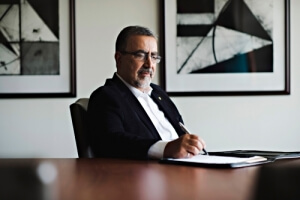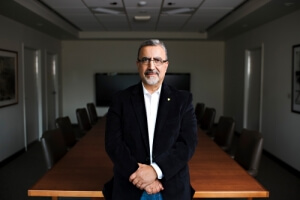Strengthening Waterloo’s Innovation Corridor
MEDI students craft bold visions for a vibrant David Johnston Research + Technology Park This story was originally published on…
University of Waterloo President Feridun Hamdullahpur discusses how UWaterloo’s entrepreneurial spirit and rich history collaborating with industry partners were pivotal to its 60 years of innovative success.

WATCH The University of Waterloo is celebrating 60 years of innovation in 2017. What for you are the stand out milestones for the institution over that timeframe?
FH Each graduating class is a milestone for Waterloo. In 60 years, we’ve grown from our first cohort of 74 engineering students to more than 189,000 alumni around the world and 36,000 undergraduate and graduate students. Some of the moments that helped define our first six decades? The launch of Canada’s first — and today, the world’s leading — co-operative education program. The founding of each of our six Faculties — Engineering, Science, Arts, Mathematics, Applied Health Sciences, Environment — each with a unique history and set of strengths. Growing our campus and our community reach with satellite locations in Cambridge (Architecture), Kitchener (Health Sciences) and Stratford (Digital Arts).
Some milestone moments in our evolution as a research powerhouse include the arrival of the IBM System/360 Model 75 on campus in 1967 — at the time the computer was large enough to fill a gymnasium-sized room — and the creation of the WatFOR programming language by undergraduate students, which helped put Waterloo on the map as a global computer science hub.
In 2012, we celebrated the beginning of a new quantum era with the opening of the Mike & Ophelia Lazaridis Quantum-Nano Centre — a celebration attended by Nobel prize-winning physicist Stephen Hawking.
The impact of many of our milestones is felt far beyond campus. Entrepreneurial culture — rooted in our early adoption of creator-owns intellectual property policy — has led to the creation of hundreds of companies by our faculty, students and alumni. Among them: OpenText, BlackBerry, Teledyne Dalsa, WATCOM (now part of SAP), Certicom, Aeryon Labs and Clearpath Robotics. The volume of high-impact startups has only grown since the founding of the Velocity student incubation and acceleration programs in 2008.
WATCH From its co-op employers to research partners, to companies & startups operating in the R+T Park, the University of Waterloo has established deep relationships with corporate and industry partners. It is ranked #1 in the world for its partnership with employers. How has the cooperation between academia and industry shaped University of Waterloo as an institution?
FH The benefits of cooperation between academia and industry are deep and reciprocal. For our more than 18,000 co-op students, workplace experience and direct exposure to the needs and processes of industry make theoretical concepts real and classroom learning richer. Industry — including some of the world’s top companies — have put down roots in Waterloo to be close to our vibrant pipeline of student, alumni and research talent. A growing number of students and alumni are launching cutting-edge companies right here in the Toronto-Waterloo innovation corridor, strengthening the economy of our province and our nation.
With the launch of the Global Entrepreneurship and Disruptive Innovation initiative, we will take these connections to the next level — creating a front door to better connect emerging industry needs with advanced university research and talent.
WATCH The University of Waterloo has achieved an international reputation for excellence, ranked as Canada’s most innovative university, and its programs rank very high amongst other academic institutions in the world — many of whom were founded much earlier. How in such a short time, has University of Waterloo achieved so much?
FH University of Waterloo outpaced many of our peers because we chose to lead rather than follow. Waterloo was born with a sense of purpose — a goal to educate a new generation of engineers to meet the needs of the growing Canadian economy. To do that, we needed to break with convention, reaching beyond the traditional ivory tower model of education to connect with the society we were built to serve.
We were the first university in Canada to offer co-operative education. At the time, many said it had no place in a traditional university. But Waterloo had no plans to be traditional. Today, that means our co-op students graduate with up to two years of paid work experience, great professional networks and less debt that many of their peers. Waterloo co-op students reported earnings of $253 million in 2016. They also get jobs sooner and tend to earn more than their university-educated peers.
When traditional institutions relied on income from research commercialization as part of their funding model, Waterloo made the bold choice to leave intellectual property rights in the hands of creators. This helped attract new faculty members with a strong entrepreneurial mindset and sowed the seeds for a campus-wide startup culture that’s among the richest in the world. This year, Waterloo was named one of the 15 schools most likely to produce “unicorns” — startups valued at $1 billion or more. These are just some of the reasons we’re consistently recognized as Canada’s innovation university.
At the very core of our success is the understanding that collaboration is a much more powerful force than isolation. Ranked the 34th most international university in the world by Quacquarelli Symonds, Waterloo is made stronger by the rich experience of faculty, students, academic and industry partners from around the world. Our world-leading research institutes — in areas such as quantum computing, nanotechnology, automotive research, water, health, energy and international governance — are built on a model of interdisciplinary cooperation.

WATCH If you were to sit down for coffee with Gerald Hagey, Ira Needles and Rev. Cornelius Siegfried, what might you ask them?
FH What would these great leaders make of the University of Waterloo today? Did they anticipate that their early vision of an institution built to serve the needs of a fast-growing society would begin to instead anticipate and even shape society? What do they make of vehicles that drive themselves; computers with their own intelligence; and programs that help students start companies of their own rather than simply preparing them to work for others? Did we make the right choices? Have we honoured and advanced their original vision?
WATCH What advice do you have for students entering University of Waterloo in September 2017?
FH My advice to students beginning a new chapter in their academic career at the University of Waterloo is two-fold. First, take risks, reach further, dream bigger and work harder, knowing that the University of Waterloo is here to help you achieve everything you are capable of doing. You are part of something truly special here, and success is within your reach. But more importantly, know that struggle is part of success, and everyone fails at some point in his or her journey, often more than once. Asking for help doesn’t make you weak — it makes you human. At Waterloo, you are part of a community that supports each other — for life. That’s both a commitment and a responsibility. Take care of each other.